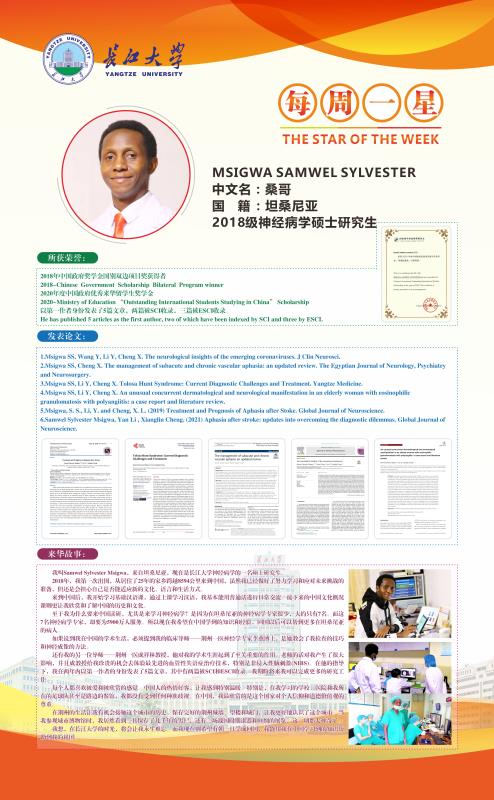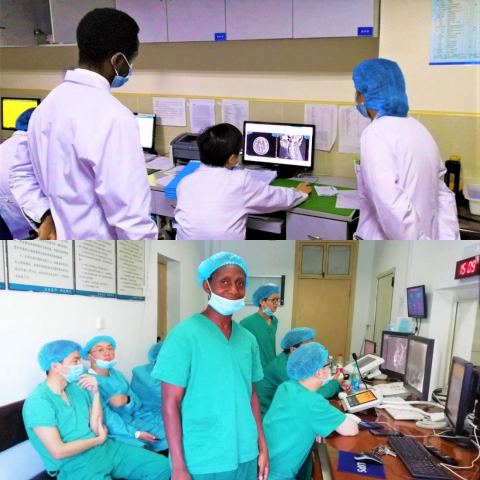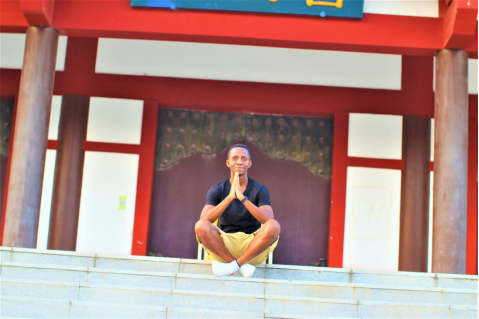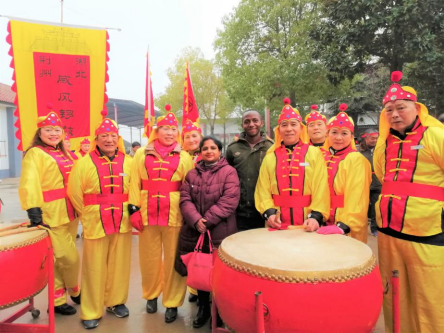
A STORY OF MY STUDY LIFE IN CHINA
By Samwel Sylvester Msigwa
My name is Samwel Sylvester Msigwa, Tanzanian Doctor of Medicine, currently Neurology resident at the First Affiliated Hospital of Yangtze University. Two years ago (2018), I got a lifetime opportunity by winning the Chinese government scholarship through the Tanzanian Ministry of Education to pursue my Masters's degree in Neurology at Yangtze University. This opportunity was a remarkable academic milestone and an excellent opportunity to make China my second home for the next three years. Indeed, this was the first time to travel outside of my country (Tanzania).
As one may expect, spanning about 8,594 kilometers away from home, where I resided for more than 25 years, could be accompanied by some worries. Remarkably, my primary concern when I got exciting news about the opportunity to study abroad was whether I could cope with a new culture, language, and new ways of living in a foreign country. Furthermore, I was overwhelmed by worries because the major I chose, Neurology, is considered to be among the most challenging medical specialties and most feared by a medical student. I presumed studying one of the most challenging medical fields in a hospital where I might not be competent enough in the patient's language would double the burden. So I set my nerves on ready for hardworking and tackling future challenges.
Surprisingly, some of the worries about living in a foreign country cleared up even before leaving my country. One week before my journey, we had a farewell ceremony at the Chinese embassy in Tanzania. The ambassador of China to Tanzania, H. E. Wang Ke's speech, offered me the first inspiration that encouraged me, and I felt that China could be a better place to live. Apart from reminding us about the long-standing diplomatic relations between Tanzania and China, which traced back to the 1960s, she ensured and encouraged us to study hard to acquire skills for Tanzania's development. When I arrived in China, my first inspiration was beautiful. I found the teacher from my university waiting for me at the Wuhan International airport, even though I arrived at night.
In the past two years I have been in China, I have accumulated many experiences spanning from academic, cultural, and social life, which deserve sharing with others. It's beyond doubt that China is rising as the most popular study overseas stop for international students, hence granting students the opportunity to heighten their global exposure. Why China for post-graduate studies? Particularly Neurology?. The presence of dedicated teachers and researchers in Grade III affiliated hospitals, Level A equipped with the most advanced international-standard medical instruments and large patient beds, offering enormous opportunity to achieve learning goals, attracted me to study in China.
Furthermore, the availability of education with the English medium of instruction was another aspect that countered my thirst to study in China. The primary concern I had before coming, which I'm progressively improving, was the Mandarin Chinese language. Since it's known to be a hurdle for English speakers, the intonation you put on a word can alter its essence, bearing a complicated writing mode with thousands of characters. The Basic Chinese class was a great way to kickstart a new life as granted me the basics of Mandarin for everyday communication. The introduction to Chinese culture class, which followed was another fantastic opportunity to endure Chinese history and culture in detail. To date, I am enjoying this great opportunity of blending the experience of both China and Tanzania towards my professional. Further, the living costs in Jingzhou city, where my university is located are relatively the same as my country and relatively low compared to Western states.
For the past two years, I have experienced high standard academic experience and good campus life. Narrating my academic life in China will not be complete without mentioning Dr. Li Yan, the Neurologist and my clinical mentor. Coming from a third world country which lacks most of the sophisticated medical types of equipment in most hospitals, I had a lot to learn about neuro diagnosis formulation from her. Dr. Li Yan taught me and organized my rotation in all departments covered so far (Neurology, Vascular, EEG, and Neurosurgery) Figure 1. She made sure I acquire physical examination skills and interpretation of neuroimaging modalities (CT, CTA, CTP, MRI, MRA, MRV, and DSA).

Figure 1, Hospital rotation at the Neurology and Vascular departments of the First Affiliated Hospital of Yangtze University, 2019/2020.
Skills for reading EEG, EMG, and Nerve conduction studies were also covered. Under her guidance, learning has been smooth, mainly because history taking abilities is not a challenge. My supervisor Prof. Cheng Xianglin has played a significant role in transforming my academic abilities. He offered me the opportunity to learn and appreciate the most advanced vascular aphasia management techniques, particularly noninvasive brain stimulation (NIBS). I have published under his supervision as the first author of five (5) articles in two years. Among the five, two in the top journals indexed in Science Citation Index (SCI) and Emerging Sources Citation Index (ESCI). With more research works expected to be accomplished in the coming six months.
Each human being admires the feeling of being loved and appreciated. I'm feeling loved and enjoy my moment in China because of Chinese hospitality. In my experience, the Chinese are friendly and often curious about foreigners; notably, I have not experienced any racist acts at the hospital where I study, playgrounds (as we form football teams together), or the restaurants. The most crucial social life aspect I appreciated in China is the respect towards individual faith and moral values. Yet, I should acknowledge that I don't experience much cultural interaction, such as jokes, because of the language barrier, which will gradually overcome.
My relationship with other international students was great; I joined the international student's football team, and participated in the International Students Union's football tournaments. Living in Jingzhou city has been an opportunity for me to experience several cultural heritage aspects and get exposed to city history. From the Warring States period, the reign of Emperor Wu in the Western Han dynasty, reign of Emperor Ling in the Eastern Han dynasty, to the Three Kingdoms period and Jin dynasty.
I learned the history of the Three Kingdoms era by touring the statue of emperor Liu's general, Guan Yu Figure 2. The well preserved Jingzhou city walls, watchtowers, and gates had extended my moment to recognize the city well. When I visited the city museum, I was pleased to see a male corpse well-preserved for decades and an exhibition of lacquerware and silk of the Warring States era. I have been visiting other famous places around the university, such as the Xuanmiao Temple and the Temple of Guan Yu. My favorite dish in Jingzhou is 'Jidan chaofan.'

Figure 2, A tour at the garden (the statue of general Guan Yu), Jingzhou city, 2020
In 2019 I visited two other cities in China, Yichang and the capital Beijing . In Yichang city, I learned about the memorable battles held during the Three Kingdoms Era. Moreover, I discovered that Yichang has plentiful water supplies. It is one of the most prominent global hydroelectric bases by harboring the Three Gorges Dam formed by the Yangtze River. In Beijing, I toured the Great Wall and Tian'anmen Square; I discovered that the forbidden city is the core of Beijing's majestic imperial antiquity.
During the COVID 19 pandemic, I had a lot to learn from Chinese standards of combating outbreaks. It's beyond doubt that China's handling of COVID 19 was acknowledged globally and set the role model standards on handling public health emergencies. The application of advanced isolation techniques, lockdowns, shutdowns of majority part of economic activities, and fast researches in identifying the SARS-COV genomic sequence, the clinical presentation of COVID cases, prevention, and new management was exceptional. Indeed, as a clinician and researcher, I had a lot to learn and contribute, thus together with my teachers, we published a review paper about "the neurological insights of the emerging coronaviruses" in the journal of clinical neuroscience: official journal of the Neurosurgical Society of Australasia.
Without a doubt, the knowledge and experience I acquired in China will be useful for Tanzania, a country with a low number of Neurologists (approximately seven), serving roughly 59 million people. Importantly, this has been an opportunity to strengthen the bilateral relationship between the two countries.

Figure 3 Attending rice wine cerebration in Jingzhou city, 2019.